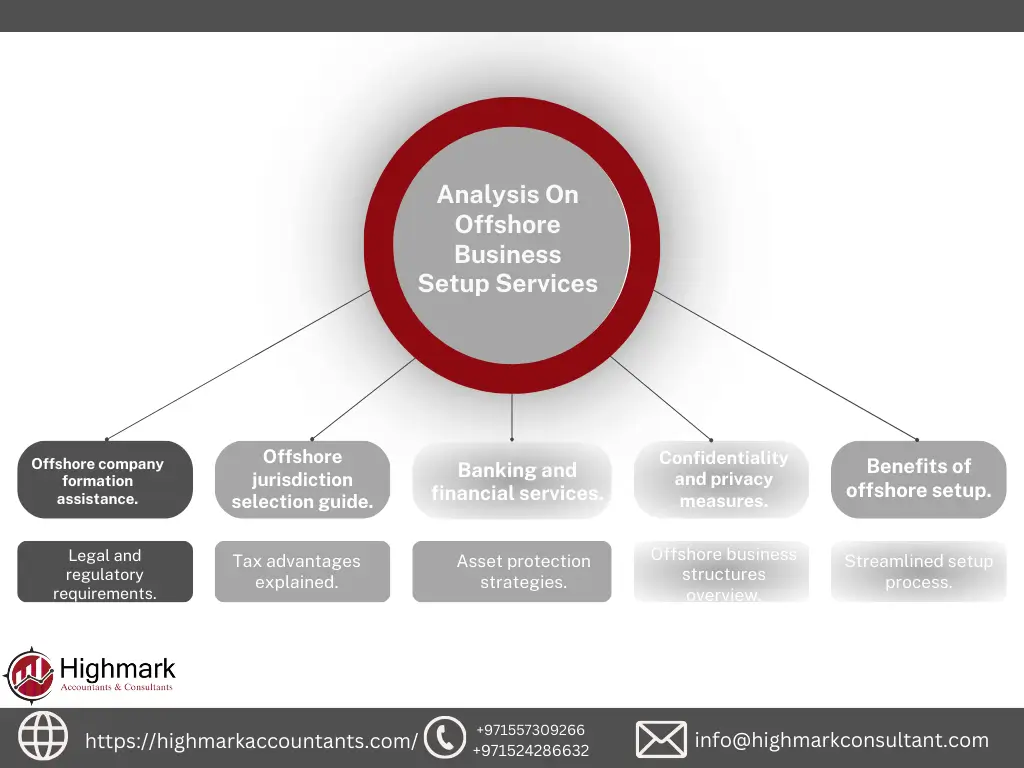Offshore Company Formations and Compliance: What Every Entrepreneur Must Know
Wiki Article
Recognizing Offshore Firm Formations: A Comprehensive Overview to the Refine and Advantages
Offshore business formations provide a calculated opportunity for business owners looking for to enhance their organization operations. These entities usually give advantages such as tax obligation benefits, raised personal privacy, and durable asset defense. Understanding the intricacies of selecting a jurisdiction, the development procedure, and conformity needs is necessary. As the landscape of global business progresses, the effects of developing an offshore company warrant cautious factor to consider. What steps should one take to browse this complex surface?What Is an Offshore Firm?
An offshore business is a service entity included outside the territory of its proprietors' home, typically in a country with positive governing and tax obligation atmospheres. These companies can serve different functions, consisting of asset protection, international trading, and wide range administration. They are commonly developed in territories referred to as tax obligation places, where corporate tax obligation rates are nonexistent or reduced, and privacy legislations are strict.Offshore companies may be had by individuals or various other business entities and can run in different industries, consisting of shopping, consulting, and finance. While they supply particular benefits, the governing and legal structures controling overseas firms differ substantially by territory. Entrepreneur need to navigate these complexities to ensure conformity with both local and international laws. Understanding the structure and function of offshore companies is crucial for people considering this alternative for company procedures or possession monitoring.
Benefits of Developing an Offshore Business
While the choice to create an overseas firm may come from numerous strategic considerations, the possible advantages are compelling for several local business owner. One substantial benefit is tax obligation optimization; numerous offshore territories provide desirable tax obligation prices or even tax exceptions, allowing firms to preserve more revenues. In addition, offshore companies often give enhanced privacy security, shielding the identities of investors and supervisors from public analysis.
Lastly, organization owners might locate functional adaptability, as overseas territories often have less regulatory hurdles, enabling streamlined monitoring and administration. Collectively, these advantages make overseas business formations an appealing choice for many looking for to increase their company perspectives.
Choosing the Right Jurisdiction
Picking the appropriate territory for an offshore business is a crucial action in optimizing the advantages described previously. Numerous factors influence this choice, including tax regulations, business laws, and the total service environment. Territories such as the British Virgin Islands, Cayman Islands, and Singapore are often preferred for their positive tax obligation routines and robust legal frameworks.It is important to take into account the certain demands of business, such as privacy needs and governing conformity. Furthermore, the ease of doing service, including the efficiency of company enrollment and banking facilities, plays a considerable role.
Possible owners need to additionally assess the political stability and track record of the picked territory, as these elements can impact long-lasting success. Eventually, detailed study and expert appointment are advised to assure positioning with the firm's goals and to utilize the full possibility of offshore benefits.

The Offshore Firm Development Process
The overseas firm development procedure entails a series of necessary steps that call for careful preparation and execution. Originally, people or services have to pick an appropriate jurisdiction that straightens with their objectives, taking into consideration variables such as tax advantages, personal privacy, and regulative atmosphere. Following this, the next action requires selecting the appropriate company framework, such as an International Company Business (IBC) or Restricted Liability Company (LLC)When the framework is established, required documents, consisting of a company strategy, identification, and proof of address, should be prepared. Engaging a reputable regional agent or company can enhance this phase, making sure compliance with regional regulations. After sending the required documents to the relevant authorities, the formation process generally finishes in the issuance of a certificate of unification. This document establishes the business as a lawful entity, allowing it to carry out company internationally.
Legal Requirements and Compliance
Understanding the legal requirements and compliance responsibilities is necessary for anybody wanting to develop an offshore company. Each jurisdiction has specific laws that have to be followed, which can include firm enrollment, acquiring required licenses, and preserving local addresses. Offshore Company Formations. It is important to designate a signed up agent who can facilitate interaction with regional authorities and assurance conformity with recurring coverage needsFurthermore, many jurisdictions call for the submission of annual financial declarations, in addition to tax obligation filings, even if the company does not create earnings. Supervisors and shareholders must be determined, with due persistance procedures often mandated to confirm their identities. Failing to fulfill these lawful commitments can result in charges or the dissolution of the company. Consequently, potential offshore company proprietors must consult with legal professionals browse around this site experienced in worldwide company law to browse these intricacies efficiently and guarantee full conformity with all laws.
Tax Obligation Ramifications of Offshore Companies
The tax obligation implications of overseas firms present substantial benefits that attract many entrepreneurs. Comprehending the associated compliance needs is necessary for steering the intricacies of international tax regulations. This area will discover both the possible advantages and the essential responsibilities associated with overseas business frameworks.Tax Benefits Review
Overseas firms are usually watched with apprehension, they can provide considerable tax benefits for organizations and people looking for to maximize their financial strategies. Among the main advantages is the potential for reduced corporate tax obligation rates, which can bring about considerable cost savings. Numerous overseas territories supply positive tax regimes, consisting of zero or very little tax obligation on revenues, resources gains, and inheritance. In addition, overseas firms can promote worldwide company operations by reducing tax obligation liabilities connected with cross-border purchases. This framework might additionally allow tax obligation deferral possibilities, allowing profits to grow without instant taxation. Ultimately, these benefits add to enhanced monetary effectiveness and asset defense, making offshore business an attractive alternative for wise investors and business owners.Compliance Requirements Explained
Offshore firms might present tax obligation advantages, however they additionally include a set of compliance demands that need to be carefully navigated. These entities go through specific reporting obligations, which differ considerably relying on the territory. Normally, overseas firms should preserve accurate financial documents and send yearly economic statements to follow local policies. Furthermore, several jurisdictions require the disclosure of useful possession to combat cash laundering and tax obligation evasion. Failure to stick to these conformity steps can cause extreme fines, including fines and possible loss of company licenses. Understanding the neighborhood tax legislations and global contracts is crucial, as they can affect tax obligation liabilities and total functional legitimacy. Engaging with lawful and monetary professionals is advisable to ensure complete conformity.Maintaining and Managing Your Offshore Business
Preserving and taking care of an overseas company involves adhering to different recurring conformity needs important for lawful operation. This includes thorough financial record maintaining and an understanding of tax obligation commitments essential to the company's territory. Reliable administration not only assures governing conformity but likewise supports the firm's economic wellness and long life.Ongoing Compliance Requirements
Ensuring recurring compliance is crucial for any type of entity operating in the overseas market, as failing to meet regulatory requirements can lead to considerable charges or perhaps dissolution of the firm. Offshore business have to follow neighborhood regulations, which might consist of annual declaring of economic declarations, repayment of essential special info costs, and maintaining an authorized workplace address. Additionally, companies are usually called for to appoint a neighborhood representative or representative to facilitate communication with authorities. Routine updates on changes in legislation or tax needs are vital for conformity. Adherence to anti-money laundering (AML) and know-your-customer (KYC) laws is essential. By keeping arranged records and remaining informed, offshore firms can guarantee they remain certified and reduce risks connected with non-compliance.Financial Record Maintaining
Reliable economic document keeping is vital for the successful monitoring of any offshore firm. Preserving in-depth and exact financial documents help in tracking the firm's performance, ensuring conformity with neighborhood policies, and facilitating notified decision-making. Business must apply methodical procedures for recording earnings, expenses, and deals to develop transparency and liability. Using audit software application can streamline this process, enabling real-time monetary evaluation and reporting. Routinely assessing economic declarations aids identify fads, analyze earnings, and take care of capital effectively. It is crucial to firmly store these records to protect delicate info and warranty very easy gain access to during audits or financial reviews. By prioritizing precise financial record maintaining, overseas firms can improve operational performance and assistance lasting success.Tax Obligation Commitments Introduction
Understanding tax commitments is important for the proper administration of an overseas business, as it straight affects financial performance and compliance. Offshore firms might be subject to different tax laws relying on their territory, including company taxes, value-added taxes, and withholding tax obligations. It is critical for service owners to remain notified regarding their tax obligation responsibilities, as failing to conform can bring about fines and lawful problems. Furthermore, many overseas jurisdictions offer tax obligation rewards, which can greatly profit companies if navigated properly. Involving an experienced tax obligation consultant or accountant focusing on global tax obligation regulation can aid guarantee that business fulfill their commitments while enhancing their tax strategies. Eventually, attentive tax obligation management adds to the total success and sustainability of an offshore entity.Often Asked Inquiries
Can I Open a Checking Account for My Offshore Business From Another Location?
The capacity to open up a savings account for an offshore company remotely depends upon the financial institution's policies and the jurisdiction's guidelines. Lots of financial institutions offer remote services, but particular requirements may differ significantly between organizations.What Are the Expenses Associated With Forming an Offshore Company?
The costs associated with creating an overseas company generally consist of enrollment fees, legal and consulting expenses, and continuous maintenance fees. These expenses vary significantly based on territory, complexity of business structure, and particular services required.Exist Restrictions on Who Can Be a Shareholder?
Constraints on shareholders differ by territory. Some countries may enforce restrictions based on residency, company, or nationality kind - Offshore Company Formations. It's vital for possible investors to research study particular policies appropriate to their chosen offshore placeFor how long Does the Offshore Firm Formation Process Usually Take?
The overseas company development procedure typically takes between a couple of days to several weeks. Factors influencing the timeline include territory requirements, file prep work, and responsiveness of pertinent authorities involved in the registration procedure.What Happens if I Fail to Adhere To Regional Legislations?
Failure to adhere to neighborhood legislations can cause severe penalties, including penalties, lawful activity, or loss of business licenses - Offshore Company Formations. It may additionally harm the company's reputation and impede future organization opportunities in the territoryAn offshore firm is an organization entity incorporated outside the jurisdiction of its owners' house, often in a country with desirable governing and tax obligation settings. One substantial benefit is tax obligation optimization; several offshore territories offer beneficial tax obligation prices or also tax obligation exemptions, allowing companies to maintain more profits. Overseas companies are often checked out with skepticism, they can offer considerable tax benefits for organizations and people looking for to maximize their economic approaches. In addition, offshore firms can facilitate international service procedures by minimizing tax obligation responsibilities connected with cross-border purchases. Offshore firms might be subject to numerous tax laws depending on their jurisdiction, including her comment is here corporate tax obligations, value-added tax obligations, and withholding tax obligations.
Report this wiki page